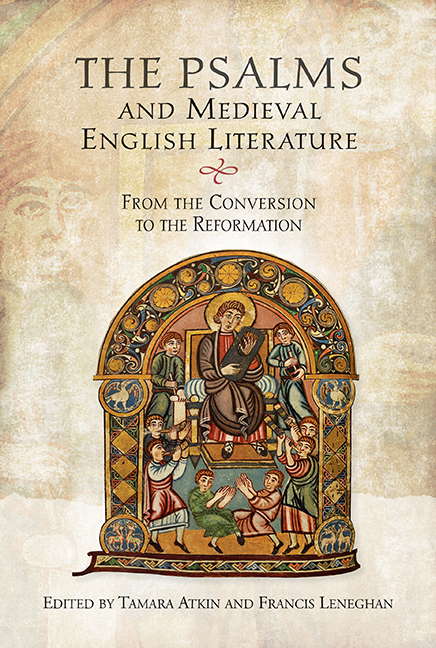Book contents
- Frontmatter
- Contents
- Figures
- Contributors
- Preface
- Acknowledgements
- Abbreviations
- Miscellaneous Frontmatter
- Introduction A Case Study of Psalm 50.13 in Old and Middle English
- I Translation
- 1 Some Anglo-Saxon Psalters and their Glosses
- 2 The Eadwine Psalter and Twelfth-Century English Vernacular Literary Culture
- 3 ‘In eching for the beste’: the Fourteenth-Century English Prose Psalter and the Art of Psalm Translation
- 4 The Wycliffite Psalms
- 5 Rolle's English Psalter and the Possibilities of Vernacular Scriptural Commentary
- II Adaptation
- III Voice
- Index
3 - ‘In eching for the beste’: the Fourteenth-Century English Prose Psalter and the Art of Psalm Translation
from I - Translation
Published online by Cambridge University Press: 09 May 2017
- Frontmatter
- Contents
- Figures
- Contributors
- Preface
- Acknowledgements
- Abbreviations
- Miscellaneous Frontmatter
- Introduction A Case Study of Psalm 50.13 in Old and Middle English
- I Translation
- 1 Some Anglo-Saxon Psalters and their Glosses
- 2 The Eadwine Psalter and Twelfth-Century English Vernacular Literary Culture
- 3 ‘In eching for the beste’: the Fourteenth-Century English Prose Psalter and the Art of Psalm Translation
- 4 The Wycliffite Psalms
- 5 Rolle's English Psalter and the Possibilities of Vernacular Scriptural Commentary
- II Adaptation
- III Voice
- Index
Summary
And if that ich, at Loves reverence,
Have any word in eched for the beste,
Doth therwithal right as yourselven leste.
(Troilus and Criseyde, III, 1328–30)Accounts of Middle English psalms tend to begin with Richard Rolle's midfourteenth- century vernacular Psalter and commentary. Such an emphasis is justifiable; Rolle's English Psalter circulated very widely, reaching a varied and receptive audience. There are, however, other extant Middle English translations of the complete Book of Psalms that have been overshadowed by Rolle' rendition. Not least among these is the anonymous fourteenth-century Prose Psalter, composed around the same time as Rolle's mid-century Psalter, or perhaps slightly earlier. Extant in four manuscripts, the Prose Psalter clearly had a much more limited circulation than Rolle's text, which survives in more or less complete form in nineteen manuscripts as well as in (a) Wycliffite interpolated version(s) in several further volumes. Nonetheless, codicological evidence suggests that the Prose Psalter was a significant text in fourteenth-century London literary culture, apparently read by audiences eager for catechetic, devotional and biblical material in an accessible vernacular. Additionally, its status as a translation of an Anglo-Norman glossed psalter offers new insights into influences on Middle English biblical culture. Further, its very particular rendition of the Psalms, in which vernacularization and gloss are combined, raises fresh questions about the perceived role of the medieval translator and the nature of biblical translation in English.
The earliest of the four manuscripts of the Prose Psalter is probably London, British Library, Additional MS 17376, dated by Ralph Hanna to c. 1330–70.6 Containing the Psalter, as well as the Eleven Old Testament Canticles and the Athanasian Creed, the manuscript also houses a selection of Latin material suitable for the use of a parish priest (also preserved separately) and concludes with seven poems attributed to William of Shoreham, extant in this manuscript alone. The poems of Shoreham, vicar of Chart-Sutton in Kent, cover areas of basic doctrine and catechesis (including the Seven Sacraments, the Hours of the Cross, the Ten Commandments, the Seven Deadly Sins and the Five Joys of the Virgin) and their suitability as companions to the Prose Psalter will be discussed later in this chapter.
- Type
- Chapter
- Information
- The Psalms and Medieval English LiteratureFrom the Conversion to the Reformation, pp. 108 - 127Publisher: Boydell & BrewerPrint publication year: 2017



